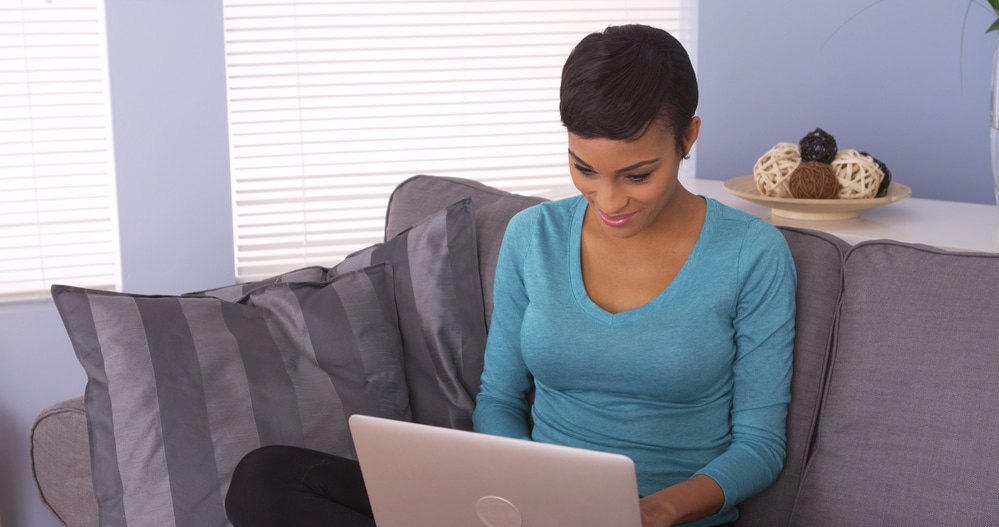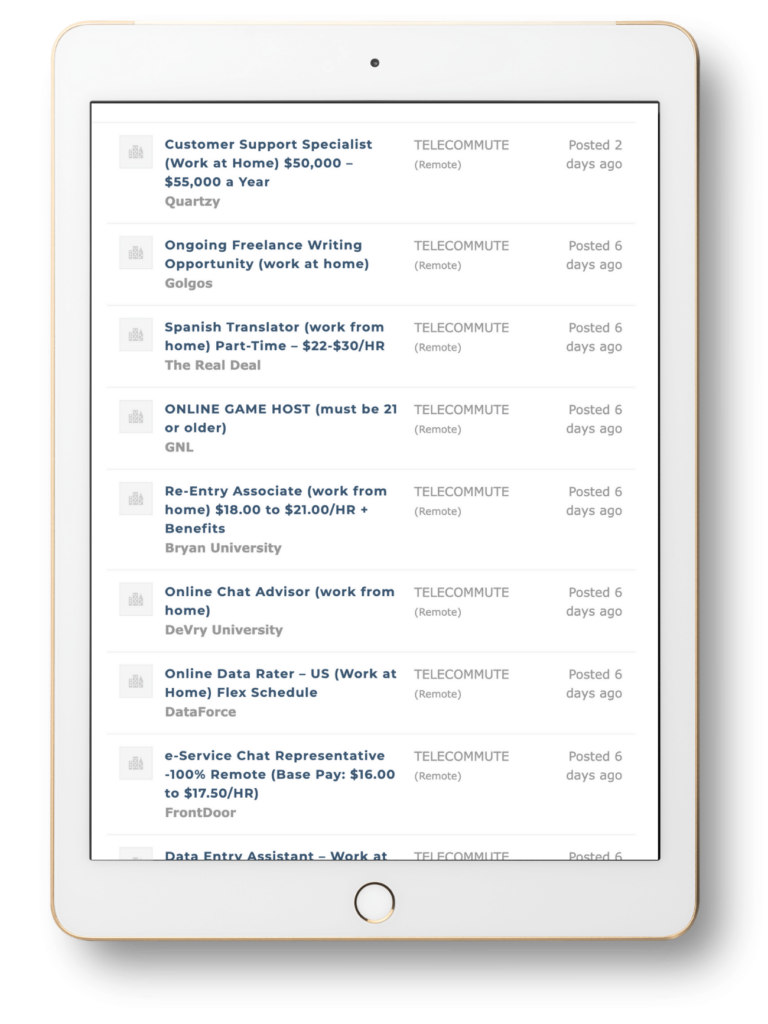This post may contain affiliate links. If you make a purchase through links on our site, we may earn a commission.
Proofreading Job From Home – Guide To Getting Started

Interview with Caitlin Pyle – She Makes a Full-Time Income Proofreading from Home
I know many of you love the idea of being a proofreader. I get several emails a month asking about how to get started, how to find a proofreading job and if I'm hiring proofreaders. Well, I don't hire proofreaders, but I wanted to bring more information on this topic to my readers. Below is an interview with Caitlin Pyle. Caitlin is an expert when it comes to proofreading careers and I've asked questions that you have asked me.
I hope you'll find Caitlin's interview helpful and informative. I know I did! She's candid, funny and really knows what she's talking about when it comes to proofreading and helping others achieve their goals of becoming a proofreader. I realize everything takes work, and no one can hand any of us a proofreading job from home — but I think you'll find this information invaluable if this is really the career you're wanting to obtain.
I want to thank Caitlin for taking the time to thoroughly answer all the questions I gave her. It's appreciated!
1. Tell us a little about yourself and how you got into proofreading.
My name is Caitlin Pyle, I'm 28, and have a husband and two cats. No kids just yet, but all of the moms out there inspire me so much :) I worked in a court reporting office for just shy of two years when I got brutally fired (not unexpectedly!). It was a horribly unprofessional experience in which my boss, the owner of the company, threatened and belittled me with some of the worst words that have ever been spoken. Ever been called a piece of trash by your boss? I have! You can read more about that on my website, but the good news out of all that is that same boss gave me my first transcript to proofread. Unknowingly, she helped set me up with a reliable way to earn an income (actually, about double what she was paying me, in half the time!). It would be a whole year following that horrific event before I'd start proofreading more than just a few hours here and there for 1-2 clients who weren't all that busy themselves. I got in touch with another agency that I knew needed a proofreader for some of their reporters, and things just snowballed. I kept taking referrals from the agency, from the reporters I already worked for, and from brand new clients who'd just heard about me “somewhere”. I always joke that I “accidentally” started doing this, and that's the honest truth — I never knew it was possible to do this job until I found myself doing it.
2. As a proofreader working from home, can you describe what an average workday is like?
Every day looks a bit different, but generally, I'm up by 7:00 or so, I eat some breakfast and get in a workout. I am a huge fan of several TV shows, but TV can be a huge time waster, so my favorite workout right now is doing intervals on my fitness trampoline… I jump while Downton Abbey is on (or whatever I'm watching), and do some strength moves during the commercials. Then I take a shower, throw on some clothes and get to work… if I have any left from the night before, that is. I often don't actually receive any work in the morning, and that's because a lot of court reporters are out doing the actual reporting, so they can't be working on jobs to send me at the same time. I tend to get work in the evenings most of the time, so a lot of my work is done at night before bed. I love finishing it all before I go to bed, so I don't think about it while I'm trying to sleep, and I can wake up with less on my “desk”. So because I work a lot in the evenings, that leaves the day wide open to do whatever else I need to do — grocery shop, meet a friend for lunch, get my nails done, take my car for service, whatever.
2024 Cash iDEAS FOR YOU!
- Paid View Point: Short, fun surveys that allow you to earn!
- Diplicious: Sell artisan dip mixes. No inventory, order online.
- KashKick: Play mobile games, take surveys, save money!
- Sell Printables on Etsy: FREE workshop on printable biz.
- Become a Transcriptionist: FREE workshop, no obligation!
- ACOP: Product Testers needed, USA, Canada, UK, Germany & France.
3. Many moms at home are on limited budgets and have limited time. Is there an opportunity for a proofreading career for these women?
Definitely. It is so much less expensive to get into proofreading transcripts than it is to get into court reporting or scoping/transcription. The education and the equipment to do proofreading costs around $500-$600, whereas court reporting schools start at $25,000 and can go up towards $60,000 for the two-year program… and that's just for tuition. You also have to buy software, the steno machine, both of which can cost up to $10,000 and you have to keep it updated, not to mention the expense of physically driving to a location to report the job. That's wear on your car, plus time spent in traffic where you're kinda stuck, unable to do anything else.
What's funny is that even though it's much less expensive to get started as a proofreader, it's possible to make similar income to a court reporter. I am living proof. According to the Bureau of Labor Statistics, the median annual income for a court reporter in the US is $48,160. My first full year proofreading for court reporters was 2013, and I earned over $47,000. The next year, I took 3 weeks off and still earned over $43,000. That's working 20-25 hours a week. Court reporters often work much longer hours and still don't earn as much… the agency could be slow or be overstaffed, too, which could cause them to not be scheduled for jobs, whereas when you're a proofreader, you have much more control over how much you work. Not getting enough work? Find more court reporters. Too much work? Turn some down.
And to answer the other part of your question about limited time, it's also possible to do this kind of work with limited time. I run three websites and teach fitness classes throughout the week and can still make $3000+ per month proofreading. It all depends on how much time you have. Not a lot of time means you seek out just a few reporters, whereas if you want to make more income, you seek out more reporters to do more proofreading. You still have ebbs and flows, though. I work for about 30 reporters, and there are still days where nothing comes in. But then the next day, I'll get 400 pages all at once.
4. I assume proofreading can be done from just about anywhere – but is the schedule flexible or are there tight deadlines?
It will vary from job to job, but it's very flexible. I have some reporters who are always late getting transcripts turned in to their office, so every single transcript they send me is a rush, meaning they need it ASAP. I generally get my work turned around in two business days, which is pretty fast. Many reporters are surprised I'm able to turn work around that quickly. Some reporters are on top of their game and get their transcripts to me a week in advance, so I have plenty of time to work on it. I also communicate well with my reporters, and ask them to send larger jobs in smaller “chunks” so I can work on it as they do, and avoid a “bomb” of 400 pages all at once landing in my inbox.
I do want to mention: you always have the option to say no. So if you get a job at 4:00 p.m. they want back the same day, but there's no way you can swing it, just tell them no. It's glorious to be able to say no. Sure, you don't get paid for that job, but your time is just as valuable and you can keep your sanity. Ultimately, you want to be happy in life and not a slave to your work, right? It's hard when you're first starting out to say no, and maybe for awhile, you won't say no in order to establish a good relationship with your reporters. However, I've heard horror stories from reporters who've sent work to proofreaders who said they could do it, and then when the deadline came close revealed to the reporter they hadn't even started the job. So the proofreader said yes, but couldn't do the job, failed to inform the client, and probably lost the client altogether. What if that proofreader had just said no? They'd probably still have the client.
5. Is there software or other “home office” equipment that someone would need to have in order to do proofreading? Are there monthly expenses or suggestions on helpful tools?
The only tools I need to do my work is my iPad and a handy, cheap little app called iAnnotate. It's $10. I bought my iPad refurbished from Apple, and there are plenty of other options like Glyde.com and Gazelle.com that sell reconditioned ones that cost even less than buying from Apple. Of course, I do need an e-mail address and access to the internet. Sometimes, though, if I'm not going to have internet for a while but still have work to do — say I've got a long flight — I'll download all the jobs before I go and work offline. I've even asked clients to send me jobs on purpose just so I can read on a flight or on a road trip (when I'm not driving, of course ;-)). I do pay for cloud accounting software using FreshBooks, but that's totally optional. There are lots of free ways to make invoices and keep track of income, I just started using FreshBooks from the beginning and it made my life so easy, I kept paying for it!
6. Are there any mistakes, or steps along the way you wish you could change or do over?
Several! Actually, three. First thing, I would have quit my job and started proofreading for my income, oh, probably as soon as I learned how to proofread. But I didn't know I could do it for a living, so I didn't. Second thing I would've done differently is started using an iPad sooner. I used to read on my laptop and type out lists of corrections, or print out the transcript, mark on the pages and then scan in the corrected pages, or I would mark up the transcript on my laptop, keep track of which pages I marked, then extract those pages with another app, then send it. SO TIME CONSUMING! iAnnotate for iPad makes all of that go away. I can look things up in seconds, I can make stamps for corrections I make often, and best of all, I can e-mail finished work straight from the app with ONLY the pages I've marked up. No more keeping track… of anything. I just do the work.
Third thing would be I would have started sharing this information with others a lot sooner. I also didn't know anyone would be interested, so I kinda just did my own thing for years. My husband would say every now and then, “Hey, why don't you do something to help other people do this, too?” And I'd have some excuse about not knowing how to do this or that, or no one would want to learn that… I struggled with a lot of self-doubt and negative thinking, which may well have had its roots in the horrible things my boss said back in 2011. Thankfully, I finally listened to my husband's encouragement and put together ProofreadAnywhere.com back in November 2014 and WOW seeing people use the information I've put together to better themselves and it actually work is awe-inspiring. I used to think proofreading transcripts was a ho-hum job, super boring and useless beyond helping my reporters look good. But the truth is, it's completely changed my life… and now it's changing others' lives, too. Watching that happen is just the best thing in the world.
Read more about Caitlyn's course. See the entire course syllabus here.
7. If you could give a potential reader wanting to have a career in proofreading your biggest secret or tip – what would it be?
Don't go it alone! Seriously. I wasted so much time and money figuring out how to do things the most efficient way that would help me earn the most money. When I got started, there was no option but to go it alone. Now that there is an option to learn exactly what to do to make it happen, I (and my very happy students) would urge you to take that option. Otherwise, you set yourself up for months or even years of frustration and failure because you're trying to break into an industry where it's really not a good idea to wing it. Reporters can tell when you don't know what you're doing, too! I created the course Transcript Proofreading: Theory and Practice to solve all of those problems. It's an A-Z roadmap for how to get started as a transcript proofreader, including the most efficient methods to do the work and find clients, plus a ton of practice materials to make sure you know exactly what you're doing. When you finish, you'll have all of the tools necessary to take action and build your own transcript proofreading business.
Caitlin Offers a FREE 7-Day Course! She'll tell you how she makes $3000+ per month proofreading… AND her top 7 marketing tips to explode your proofreading business.
ProofreadAnywhere.com









Am I reading the other questions/comments correctly? In taking the course, you would still need previous experience as a proofreader to be able to get a job?
@Christina
Thanks for your input — I think everyone’s opinion has value and it helps when folks share. Some moms at home would be thrilled with $43K a year all from working at home — I know I would be! But I understand what you’re saying.
I find it a little misleading that she’s comparing the earnings of a court reporter to those of a proofreader. It’s a perfectly legit profession (although most court reporters will want their proofreaders to be proficient in CAT software and be able to read steno notes — a much more technical skill that I’m not sure the course teaches), but the main reason to get into proofreading vs. reporting is that you want a skill that’s easier, faster, and cheaper to learn compared to steno reporting, and that you want to work from home. But not the income. Realtime court reporters in urban areas average $1,000 or more per job, so it’s not unrealistic for them to make a REALLY good income, often breaking six figures in annual earnings. But then their job is also extremely skilled, technical, and hard to learn, so it’s only fair for them to be paid this well. It’s no coincidence that court reporting schools have a 90% drop-out rate. The skill is THAT difficult to learn, so those who do graduate have a rare skill and are in high demand. There is no shortage of work for realtime reporters in urban areas. One can sign up with multiple agencies if they wish. Reporters who work in courts are paid transcript fees on top of their court earnings which often add up to as much as — or more than — their annual court salary. And their job is a regular 8-4 with benefits. The top dogs in the profession make in excess of $200K. You can’t compare that with how much a proofreader makes. Her $43K per year is probably the high end of what you can expect to make IF you’re a top-notch proofreader with a lot of clients, working full time, accepting at least some of the hardest assignments (see below), and have a stellar reputation.
Also, there are a lot of caveats about work flexibility. Yes, technically you can set your own hours. In reality, you can expect most of your work to come in after hours, simply because reporters are busy working earlier in the day. You have every right to refuse overnight or weekend assignments, but these are what reporters need the most and what pays the big bucks. So if, say, a mom wanted to do this job and intended to work in the morning/afternoon while the kids are at school and keep the evening as family time and her weekends free, then she’d have to pass on all the expedited jobs that pay the best and only take on the less urgent jobs that command much more modest fees. Many reporters will proofread their non-urgent transcripts themselves to save money and will only outsource the expedited ones out, so the ability to work at least some unsociable days/hours will put a proofreader ahead of the competition. But, all of a sudden, it’s not such a flexible job after all because you have to align your schedule with what your clients need. The alternative is to compromise for more modest fees, potentially less work, and more competition.
I don’t mean to be negative, but realistic expectations is key and people should not buy into a glossed-over version of reality, especially if that involves spending a good chunk of money to get there.
I am a good reader but I have never been a proofreader. I am retired and over 60 years old. I need extra income. Would this be something I could get into without experience? Would Caitlin’s training course be enough, or should I try something else?
@Jacey
You can certainly apply. But most will probably want experience.
I have a 4-year degree in finance. I read a ton. Do I need more education or experience to become a proofreader? I’d love to get started asap. Can I just apply to jobs to get started?
how to take proof reading job work in home
@Marsha
Her proofreading income was already $3000 a month before she ever created her course :/
Of course she makes $3,000/month. That’s how much she charges after the 7-day *FREE* course. Yes, I’m bitter.
Thanks very much for the information
I’m very interested in becoming a Proofreader!
If you go to this page, there is a BIG bar underneath the picture with Free 7 Day Intro Course and an Enroll Now button.
Where can I take the free course?
I need this job like yesterday. I am very interested in the class.
I am a former court reporting graduate, and would like to proofread to improve my skills for the day that I actually start reporting, How do I get started
I have a bachelor’s degree in Information Science with an Associate’s Degree in English Writing. I use my writing skills daily and have done proofreading for many years. I was wondering how to obtain employment in this particular field? My family calls me the “Grammar Dictator” and I have won several area spelling bees. Thank you very much.
How do you find the proof reading jobs?
@Vivian
I can certainly relate. Even now my family and I struggle every month. I have no idea what it’s like to be debt free — but would love to one day. Regarding Caitlin’s proofreading program (since you posted this comment on the page about it) — I urge you to reach out to her and discuss your fears…. ask questions. Caitlin (nor do I) promise anyone a job. Even if you get a 4 year degree, the college doesn’t promise you a job. She does however offer training that allows you to pursue a career that interests you. The rest is up to you.
I HAVE BEEN SCAMED WAY TO MUCH TRYING TO FINED WORK FROM HOME EVERY MONTH I’M TRYING PICK WHAT BILLS I’M GOING TO PAY
Hi I’m Agnes,22 years old and I live in Kenya.my question is would it be possible for me to earn while I’m around here?
@Kay
I am so sorry to hear about being bullied. That’s awful. Please reach out to Caitlin — tell her your story. I am sure she can reassure you that you’re never too old. What is the quote from CS Lewis – “You are never too old to dream a new dream.”
I am going to be 59 in December. Divorsed and been at my job for 36 years. Within the last 5 to 6 years I have been bullied harassed and actually driven to a breakdown by my manager who only treats me the most unfairly. I do a very good job work harder than most and the Doctor who is the real boss has been told and and has had 2 workers quite because of her. But I feel stuck knowing I have no one to fall back on and need the money I make.I am in the dental field and to start over at my age would be hard let alone a big cut in pay. Am I too old to try this program? Desperate too be happy and appreciated for the work I do. Thanks
I’ve spoken to several that have taken the class and I would actually be in the class right now if I had the money for it (still saving it up) — my suggestion is to take the 7 Day Free course and then see if you like it and you’re grasping it. I have mistakes all over my website and I am going to take the class — I wouldn’t let your education/experience stop you in any way. Just do the free course and see how you feel after that. Be sure to ask Caitlyn any specific questions you have. She is extremely hands on and wants everyone to succeed.
I’m 19 years old with a high school diploma, and a small amount of college classes completed. I wouldn’t say I’m amazing at spelling and grammar, but I’m definitely not the worst. I have about two years of work experience, but only as a kennel attendant at an animal hospital, and as a carhop, gone on to become associate manager at a Sonic (where I still currently work.) I was just wondering if you think proofreading would be a viable option for me, with no real education, or experience under my belt? I’ve already signed up for the free 7 day course on Caitlin’s website. I figure it’s a free learning experience, if nothing else.
@Anne
LOL – I’m the same as you. When I go through pages of my sites sometimes to just update or look over – I think, wow… what a typo or wrong word…etc. But Caitlin makes it seem possible for any of us to be a proofreader if we really want to.
How interesting. I guess I didn’t really clue in that this was a full time job! It makes complete sense, I mean I am a grammar and spelling train wreck more often than I would like. Thank you so much for sharing all of this information, Caitlin!
Proofreading is a good job for real moms… Thanks for this info,
@Daniel
I’ve not heard of the “real translator” program. It’s something I have not reviewed, so I am sorry it was a bad experience for you. Perhaps you clicked on a third party ad and left my site?
i was drawn to your website because i read your review on clicksbank , real translator that some of it is scam, that they ask for upfront registration money, so i follow your link , click and swamp of email come to me and some of them is asking for registration fee also before i start work. why is so? i am confused.
one time i paid money to register after that request for money some more. i feel cheated and i stopped
@Nancy
I would use Caitlin’s 7 day free course.
I was a medical transcriptionist for over 10 years, retiring in 2013 due to stress, abuse by the owner and now find myself with a lot of time on my hands. In addition, I transcribed overflow work for a few years for a local attorney.
Proofreading and a flexible schedule are both appealing to me.
What is the next step to pursuing this opportunity?